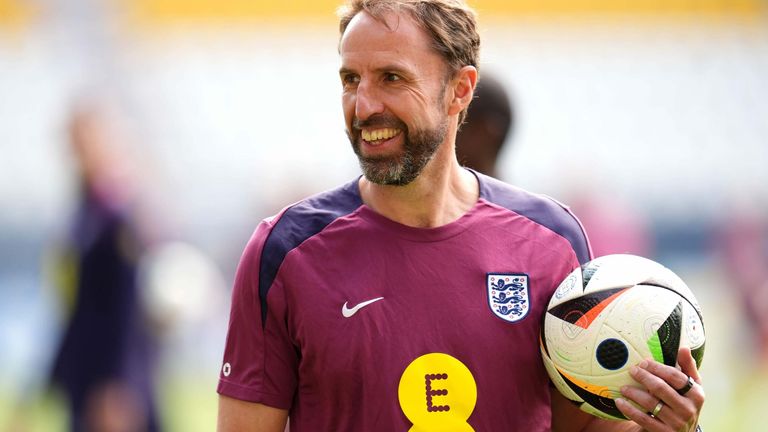The England team are taking no chances ahead of Euro 2024 as they sport titanium health rings worn by some of the world’s biggest celebrities.
As the team trained for their first Euro 2024 against Serbia on Sunday, manager Gareth Southgate was spotted wearing an Oura tracking ring.
Midfielder Conor Gallagher was spotted wearing one too and defender John Stones once described his as “addictive”.
“We’re beaming with pride when we see these elite athletes choose Oura, that’s really cool,” said Dororthy Kilroy, the company’s chief commercial officer, to Sky News.
So what is it?
Wearable trackers like the Oura ring monitor aspects of the wearer’s health, like their sleep, heart rate, stress levels and periods of activity.
For most of us, they can remind us to look after ourselves. For athletes, they can help them reach peak performance.
“The ring is now extremely sophisticated,” said Joao Bocas, a wearables expert who runs the digital healthcare company Salutem.
“It records the heart rate, variability in skin temperature and resting heart rate. [The new model] offers the blood oxygen sensor sensing capabilities, it even offers life insights about daytime stress and resilience.”
So will it give England the edge?
England are already favourites to win the Euros but the men’s team have never lifted a trophy at the competition.
They’ll be looking for anything that will help them bring home some silverware.
Dave Thomas works with England’s Olympic and Paralympic athletes at the UK Sports Institute where he leads on “future technology”.
He says the ring may offer the England team’s sports scientists another perspective on how their players are getting on during the tournament.
“In a sporting environment, you have a number of different wearables for different contexts,” Mr Thomas told Sky News.
“They give indications of whether [the athletes] could be about to come down with a bug or they’re overloaded.
“It can give the sports scientists or the coaches that indication that we need to back off a little bit and give them a bit of a rest.”
Mr Thomas pointed out that while he usually works with wearables that aren’t commercially available, trackers like the Oura ring can be more convenient for the athletes – which means they actually use them.
“[Commercial trackers] are reliable and there’s a low faff factor. Whereas a lot of the stuff, as you increase the level of measurement precision that you want and accuracy and confidence, that builds more hassle around the athlete.
“Really they just want to concentrate on playing, concentrate on training and concentrate on resting.”
Are trackers like this the future?
Health trackers have been around since the 1960s – there was always a dusty pedometer in the kitchen drawer growing up – but there’s been a boom in the market recently.
Celebrities have jumped onboard, with Kim Kardashian, Prince Harry and Gwyneth Paltrow all donning Oura rings, which can cost in the range of £300-£550.
“There is definitely a trend of ‘fashion tech’, of being seen wearing the latest gadget,” says Mr Bocas.
“But I also think COVID-19 raised our awareness of what is important [in terms of our health].”
Ms Kilroy from Oura agrees. She thinks the pandemic set off the growing demand for wearable health tech.
“We all felt very out of control of our health, right? Things were happening and we were rushing to Google to get answers,” she said.
“So having access to your own data about how your body is doing – I think being able to understand that and being empowered with that data yourself, once you get a taste of that, it’s actually feels really liberating.”
But according to Mr Bocas, we won’t be wearing health jewellery for long.
“In five, 10 years’ time, the wearables we’re seeing today will become obsolete, the bracelets, the rings, the watches,” he said.
“Technology has advanced so much that we have sensors that will go in our clothes, in our belts, in our glasses, in our shoes. Even, if I can be a bit controversial here, implantable skin sensors where we won’t need to wear anything.”
For now, England fans will be hoping the ring on some of the team’s fingers will be enough to make them champions.



























